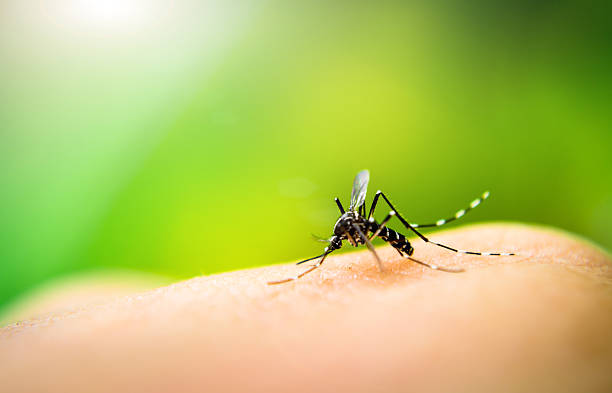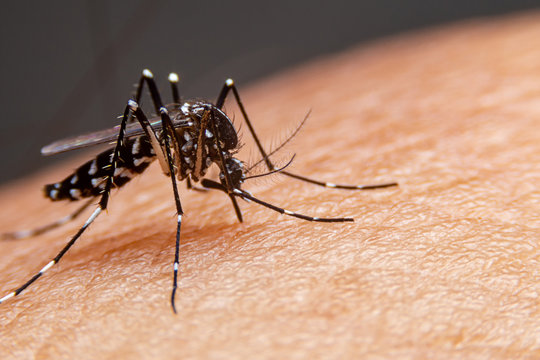
Mosquito sucking blood on human skin with nature background
What is Dengue Fever?
Dengue fever is a mosquito-borne viral infection that can cause severe flu-like illness and, sometimes, develop into a potentially lethal complication called severe dengue. The disease is prevalent in tropical and subtropical regions around the world.
Causes of Dengue Fever
The main cause of dengue fever is infection with the dengue virus, which is transmitted to humans through the bites of infected mosquitoes. Here are the key points regarding the cause of dengue fever:
1. Dengue Virus
Dengue fever is caused by any one of these four closely related viruses, known as Serotypes:
– DENV-1
– DENV-2
– DENV-3
– DENV-4
Serotypes refer to distinct variations within a species of bacteria or virus, classified based on their cell surface antigens. These antigens can be proteins, polysaccharides, or lipids that elicit an immune response. Identifying serotypes is crucial for understanding the epidemiology of infectious diseases, developing vaccines, and designing effective treatments.
2. Mosquito Transmission
– Aedes Mosquitoes: The primary dengue virus vectors are Aedes mosquitoes, particularly Aedes aegypti and Aedes albopictus.
– Bite of an Infected Mosquito: The virus is transmitted to humans through the bite of a female mosquito that is infected with the dengue virus. The mosquito becomes infected when it bites a person who has the virus in their blood.
3. Mosquito Breeding Sites
– Standing Water: Aedes mosquitoes breed in stagnant water found in containers like buckets, flower pots, discarded tyres, and other places where water can collect and remain undisturbed.
4. Geographical Distribution
– Tropical and Subtropical Regions: Dengue fever is prevalent in tropical and subtropical regions around the world, including Southeast Asia, the Pacific Islands, the Caribbean, South America, and parts of Africa. Urban and semi-urban areas are particularly affected due to the close human-mosquito proximity.
5. Human Factors
– Travel: People travelling to and from dengue-endemic areas can spread the virus to new locations if bitten by local Aedes mosquitoes.
– Population Density: High population density in urban areas increases the likelihood of mosquito-human interactions, facilitating the spread of the virus.
6. Climate Conditions
– Warm Temperatures and Humidity: Warm and humid climates are conducive to the proliferation of Aedes mosquitoes, leading to higher transmission rates of the dengue virus.
By understanding these causes, efforts can be directed towards controlling mosquito populations, reducing exposure to mosquito bites, and preventing the spread of dengue fever.

Symptoms of Dengue Fever
Dengue fever can cause symptoms that continue for two to seven days, usually starting four to ten days after an infected mosquito bite. They include:
- High fever
- Severe headache
- Pain behind the eyes
- Joint and muscle pain
- Nausea and vomiting
- Fatigue
- Skin rash, which appears two to five days after the onset of fever
- Mild bleeding (such as nosebleeds, gum bleeding, or easy bruising)

In some cases, dengue can develop into severe dengue (also known as dengue hemorrhagic fever), which can cause:
– Severe abdominal pain
– Persistent vomiting
– Rapid breathing
– Bleeding gums
– Fatigue
– Blood in vomit or stool
– Restlessness
– Damage to blood vessels and lymph
– Leakage of blood from vessels
– Decrease in blood platelets leading to severe bleeding
– Organ impairment
Treatment
There is no specific anti-viral treatment for dengue fever. Management focuses on supportive care:
– Hydration: Maintaining body fluid volume is crucial. Oral rehydration solutions are recommended, and intravenous fluids may be necessary in severe cases.
– Pain Relief: Acetaminophen (paracetamol) is commonly used to reduce fever and pain. Avoid aspirin and nonsteroidal anti-inflammatory drugs (NSAIDs) like ibuprofen, as they can increase the risk of bleeding.
– Medical Care: Severe cases require hospitalization and supportive care in a clinical setting to monitor and manage complications.
Prevention
Prevention of dengue fever involves avoiding mosquito bites and controlling mosquito populations:
1. Mosquito Control:
– Eliminate standing water where mosquitoes breed (e.g., containers, tyres, flower pots).
– Use mosquito repellents and insecticides.
– Install screens on windows and doors.
– Use mosquito nets while sleeping, especially in areas where dengue is common.
2. Personal Protection:
– Wear long-sleeved shirts and long pants.
– Apply mosquito repellent containing DEET, picaridin, oil of lemon eucalyptus, or IR3535.
– Use mosquito coils and vaporizers in living areas.
3. Vaccination: A vaccine called Dengvaxia is available but is recommended only for individuals who have previously been infected with the dengue virus and live in endemic areas. It is not widely recommended due to potential risks in individuals who have not been previously infected.
By following these guidelines and being aware of the symptoms, individuals can reduce their risk of dengue fever and seek appropriate treatment if necessary.
For advertising and content publication, contact Xylose magazine via WhatsApp on 0574170347


